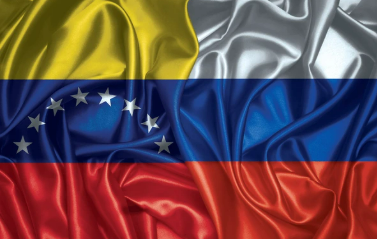Understanding Sanctions in Practice: A Guide for Businesses and Financial Institutions
With a look at Russia and Venezuela as case studies
SANCTIONS INSIGHTS
9/15/2025


Sanctions are no longer just diplomatic tools, they’re an everyday business reality. Whether you run a regional bank in the Gulf, manage a trading company in Dubai, or operate a fintech platform serving international clients, sanctions directly shape how payments, supply chains, and cross-border deals work.
This guide explains what sanctions actually do, how the UK, EU, and US approach them differently, and how their real-world impact plays out in practice. To bring this to life, we use Russia and Venezuela as case studies—two countries that illustrate how sanctions can reshape global trade and finance.
🌍 What sanctions actually do
Sanctions are designed to create friction in business activities, making certain transactions slower, harder, or even impossible. For companies, that means added compliance checks and strategic planning.
Across the UK, EU, and US, sanctions often include:
📝 Lists of restricted individuals and companies – being listed means no access to banking, trade, or services.
❄️ Asset freezes – blocked funds and property can’t be moved or used.
🚫 Trade and export restrictions – limits on selling technology, goods, or services, especially in sensitive sectors.
💳 Financial restrictions – limits on loans, investments, or capital market access.
✈️ Travel bans – restrictions on entry and movement for certain individuals.
🟢 Licenses and exemptions – regulators sometimes allow humanitarian or essential trade.
📌 Key idea: sanctions don’t tell you how to do business, but they set the “red lines” that companies and financial institutions must navigate carefully.
⚖️ How the UK, EU, and US differ
Although aligned in many cases, sanctions regimes have distinct features:
UK – The Office of Financial Sanctions Implementation (OFSI) issues lists and guidance. UK sanctions apply independently from the EU since Brexit.
EU – Measures apply across all member states, though enforcement may differ by country.
US – Sanctions often have extra-territorial reach, applying globally when USD, US banks, or US-linked persons are involved.
📌 For global businesses, overlap between regimes is common, so companies often track UK, EU, and US sanctions lists side by side.
Case study: Russia
Russia is one of the most sanctioned countries in modern history, facing wide-ranging restrictions from the UK, EU, US, and others.
Key impacts:
❌ Individuals and companies blocked – including major banks and state-owned firms.
🏭 Sector-specific bans – restrictions on energy technology, aviation, defence, and advanced manufacturing.
💸 Payment disruptions – many cross-border transfers rejected, particularly those routed via USD or EUR.
🔄 Workarounds – growing reliance on non-USD currencies (CNY, AED, INR) and alternative banking networks.
📌 Business lesson: even if a company is not directly trading with Russia, exposure can come through indirect routes, such as a supplier, freight forwarder, or counterparty linked to a sanctioned bank.
Case study: Venezuela
Venezuela provides another perspective, particularly relevant to energy markets.
Key impacts:
⛽ Oil and energy sanctions – restrictions on the state oil company (PDVSA) have reshaped global oil flows.
💰 Financial limits – US sanctions restrict Venezuelan bond trading and access to US capital markets.
🚢 Trade challenges – shipping companies and insurers face restrictions when handling Venezuelan crude.
📌 Business lesson: sanctions can reshape entire industries, affecting not just direct trade partners but also insurers, logistics providers, and downstream buyers.
🏦 What financial institutions and businesses notice in practice
Financial institutions:
💳 Payments or transactions rejected when sanctioned names or entities are involved.
🔍 Higher compliance costs due to continuous screening obligations.
⚠️ De-risking strategies – some institutions reduce exposure by limiting or exiting higher-risk regions, sectors, or counterparties.
Businesses:
📦 Exporters must screen products and buyers against multiple regimes.
🔗 Supply chains disrupted if a key link becomes sanctioned.
📜 Contracts reviewed or voided if counterparties are restricted mid-term.
💱 Alternative payment methods (non-USD trades, escrow, or third-party intermediaries) may be required.
📌 Overall effect: increased compliance costs, slower deal cycles, and the need for compliance-led decision-making.
🛠️ Practical steps to reduce friction
To stay resilient, financial institutions and companies should:
👀 Monitor multiple sanctions lists – UK, EU, US, and local requirements.
🤝 Screen customers, partners, and suppliers – not just direct clients.
⏱️ Plan for delays – expect longer settlement times or rejected transfers.
🔄 Review supply chains – identify backups for critical suppliers early.
📅 Stay updated – sanctions can change overnight.
🗂️ Document compliance efforts – notes and audit trails matter if regulators ask questions.
💡 Key takeaways
⚠️ Sanctions are about friction, not punishment – they block or slow transactions to achieve policy aims.
🌐 Impact spreads beyond borders – indirect exposure matters, especially in global supply chains.
✅ Prepared organisations adapt faster – awareness, monitoring, and contingency planning are essential.
📌 For businesses and financial institutions, sanctions are not just “foreign policy issues.” They shape the flow of oil, gas, finance, and trade routes that underpin regional markets. The companies that succeed are those that anticipate disruption and build compliance into their strategy.
Contact Us
📍 Dubai Digital Park, Dubai Silicon Oasis, Dubai, UAE
✉️ info@complysphereadvisory.com
© 2025 Comply Sphere Advisory FZCO
Licensed by Dubai International Free Zone Authority (IFZA) – License No. 67882
Providing consultancy, risk management, and professional training services within IFZA licensing scope.
Legal & Policies


